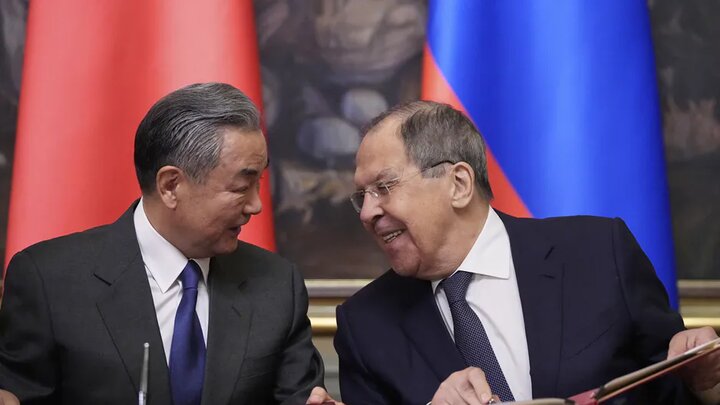Wang Yis Russia visit highlights Chinas commitment to multilateralism global stability
Wang Yi's Russia visit highlights China’s commitment to multilateralism, global stability
BEIJING - The three-day trip of Foreign Minister Wang Yi to Russia has highlighted China's involvement in promoting global peace and stability, especially regarding the resolution of the Russia-Ukraine conflict.

The Chinese foreign minister was on a three-day official visit to Russia from Monday to Wednesday, where he held a series of top-level meetings with Russian officials, including President Vladimir Putin and Foreign Minister Sergei Lavrov.
In a meeting with Putin in the Kremlin on Tuesday, Wang said China and Russia are committed to advancing multilateralism and democratizing international relations. He added that both nations reinforce the United Nations' central role in the global system.
Wang stressed that Beijing-Moscow collaboration "never targets third parties" and remains impervious to external interference.
Putin, for his part, said he will meet with President Xi Jinping during World War II victory celebrations in Moscow on May 9.
“We will have an opportunity to discuss the current state of bilateral relations and our interaction on international venues, primarily the UN – the UN Security Council – as well as the Shanghai Cooperation Organization, BRICS, and a number of other platforms where we work together with great success,” the Russian president said.

The Chinese and Russian foreign ministers put emphasis on “the need to neutralize the root causes of the Ukraine conflict”
The top Chinese diplomat further discussed the conflict in Ukraine with his Russian counterpart and the need for a lasting peace agreement.
“The sides exchanged opinions about the prospects of resolving the Ukraine crisis. They stressed the need to neutralize the root causes of the conflict,” according to the Russian Foreign Ministry.
The ministry added, "(The ministers) touched on individual regional issues related to the situation on the Korean Peninsula, Iran's nuclear program and the state of affairs in Central Asia."
In an exclusive interview with Russia Today in Moscow, Wang commended the "non-alliance, non-confrontation and not targeting any third party" new model of major-country relations in the modern era. He told the Russian news channel that the model is also an important force for stability in a turbulent and changing world.
China's initiatives to address the Ukraine conflict reflect its dedication to multilateralism and global stability.
***Shen Shiwei told the Tehran Times that “Europe is not on the negotiation table (over the Ukraine conflict) and often neglected and even stabbed by the US side” ***In recent years, Beijing has actively contributed to peace and stability in West Asia. Notably, in 2023, China was instrumental in facilitating a rapprochement between Iran and Saudi Arabia. In July 2024, a deal mediated by China was signed in Beijing between Hamas and Fatah, aimed at resolving their disputes. Representatives from these Palestinian factions engaged in discussions with Wang after reconciliation talks that included a number of other Palestinian groups.
As a representative of the Tehran Times here in the Chinese capital, I reached out to Shen Shiwei, a research fellow and expert in international relations based in Beijing, to obtain his perspective on the potential impact of Wang’s visit to Russia on the resolution of the Ukraine conflict.
“China welcomes and supports all efforts for peace, including the US-Russia talks. As Chinese Foreign Minister Wang Yi has reiterated, China is ready to play a "constructive role" in resolving the war in Ukraine when he was interviewed by RT during his visit in Russia. As we know, China has been calling for a political settlement through dialogue and negotiation since the first day of the crisis, and has been actively working for peace and pushing for talks,” Shen said.
I inquired if China could assume a similarly pivotal role in resolving the Russia-Ukraine conflict, akin to its significant involvement in facilitating a reconciliation between Iran and Saudi Arabia.
“The situation is different. To have an end to the Russia-Ukraine conflict, a security framework that includes European countries is a necessary choice. But so far, we have seen that Europe is not on the negotiation table and often neglected and even stabbed by the US side, and that has caused a lot of trouble for a comprehensive peace agreement,” the renowned expert said.
I also asked for his perspective on how China's policies influence its approach to various international issues, particularly those related to Iran's nuclear program.
“On the Iranian nuclear issues, we know that the Trump administration is increasing pressure on Tehran. We could go back to the China, Russia and Iran joint statement on the Iranian nuclear deal issued on March 14. Also, Chinese Foreign Minister Wang Yi has issued a five-point keynote summarizing Beijing’s position on the issue and reiterated that Iran should continue to adhere to its commitment not to develop nuclear weapons, while all parties should fully respect Iran's right, as a signatory to the Treaty on the Non-Proliferation of Nuclear Weapons, to the peaceful use of nuclear energy,” Shen said.
The Chinese foreign minister hosted Iranian Deputy Foreign Minister Kazem Gharibabadi and Russian Deputy Foreign Minister Sergey Ryabkov at Diaoyutai State Guest House in Beijing on March 14, 2025. The talks focused on Iran's nuclear program.
Earlier that day, Chinese Vice Foreign Minister Ma Zhaoxu held talks with the Iranian and Russian deputy foreign ministers at the same location. At the end of the meeting a joint statement was issued in which Russia and China stressed “the need to fully respect Iran's right to peaceful uses of nuclear energy as a State Party to the NPT.”
Trump has recently threatened to bomb Iran unless Tehran comes to an agreement with Washington on its nuclear activities. Iran has described Trump’s threat as an “affront” to global peace and security, a violation of the UN Charter and a betrayal of Safeguards under the International Atomic Energy Agency (IAEA).
source: tehrantimes.com